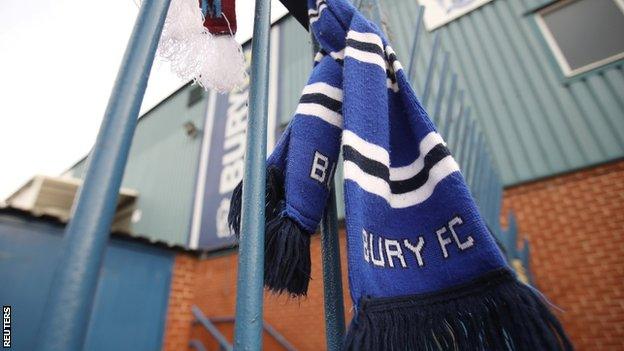Bury owner Steve Dale renews attempts to settle debts after initial CVA terminated
- Published

Bury were unable to fulfil a single fixture in 2019-20 prior to their expulsion from the English Football League
The future of Bury FC remains uncertain after owner Steve Dale renewed his attempt to settle the club's debts.
A leaked document seen by BBC Radio Manchester says Dale is seeking a new company voluntary arrangement (CVA) to be considered by creditors.
Notice of a previous agreement being terminated was issued on 9 March after it expired in January.
The development means creditors are now "free to take action" to recover debts from the 135-year-old club.
Steven Wiseglass, supervisor of the original CVA which was issued in July 2018 but is now terminated, has written to creditors saying they are "no longer bound by the terms" of that arrangement.
He has also outlined that Dale has asked that creditors take no action "within the next few weeks (in order) to facilitate" a new CVA proposal.
Wiseglass states that if no new CVA is agreed by 1 April, then he will seek to wind-up the club and appoint a liquidator.
How did we get here?
Bury's creditors approved a CVA proposal last July which would have seen the club's football creditors paid in full.
Unsecured creditors, including HM Revenue & Customs, were due to be paid 25% of money owed.
That rescue plan, which amounted to an insolvency event, saw Bury deducted 12 points, but they were eventually expelled from the English Football League in August after a proposed takeover collapsed.
Bury, who had won automatic promotion from League Two just three months previously, were the first team to drop out of the EFL since Maidstone's liquidation in 1992.
And while they are a club without a league, or players, they remain a business.
However, a new club, Bury AFC, has applied for a spot in the North West Counties League for next season.
What is a company voluntary arrangement?
An insolvent company can use a CVA to pay its creditors over a fixed period and, if they agree, it can continue to trade.
The company needs to apply for its CVA through an insolvency practitioner who, within a month of their appointment, will work out an arrangement to cover how much of the debt it can pay as well as a payment schedule.
The creditors will then be invited to vote on the arrangement, however, the proposal must be approved by creditors who are owed at least 75% of the debt.
If 75% of creditors cannot agree on the arrangement, the company could face voluntary liquidation.